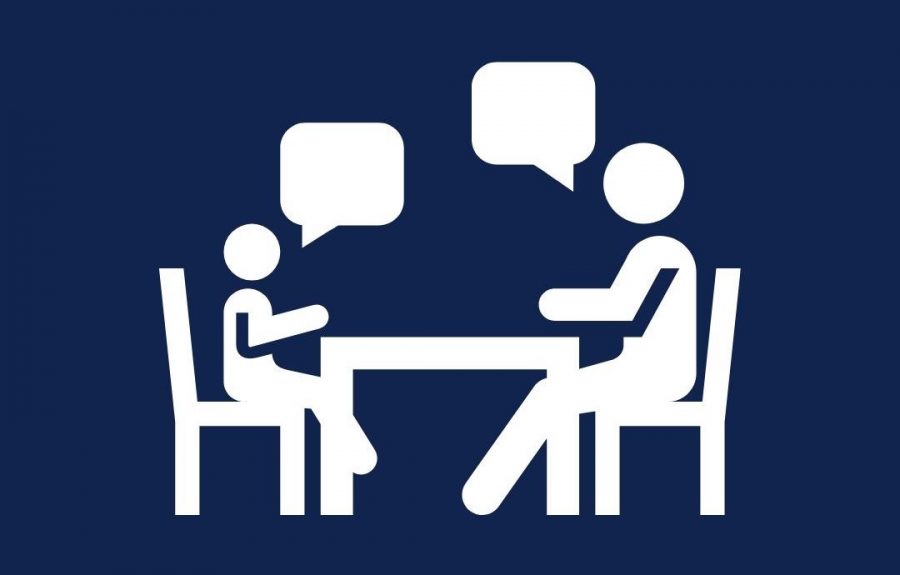Here to Help
Lead Counselor Shannon Petersen On Supporting Students During COVID-19
Lead Counselor Shannon Petersen On Supporting Students During COVID-19
Lead counselor Shannon Petersen loves helping high school students navigate an important time in their lives. Unfortunately, because of COVID-19, Petersen has not been able to help students as much as she would like to.
“I feel like I’m not seeing students half as much as I used to,” Petersen said. “That’s my favorite part of the job, so it’s really sad for me as a counselor.”
While Petersen would rather help students make important decisions about college or guide them through stressful situations, she now spends most of her time scheduling.
“Every time a student moves from KVA to face to face and vice versa, I have to completely redo their schedule,” Petersen said. “It sounds like it would be easy, but it’s not. It’s a constant puzzle to make sure I can get a student in [their] classes.”
Although counselors are busy with scheduling, Petersen wants students to know that counselors are always available to help all students, regardless of whether they are learning from home or at school.
“Email is the fastest way [to contact a counselor],” Petersen said. “I [also] do Zooms with my KVA students.”
Students can get help from any counselor, but Petersen believes it is best for students to contact the counselor they were assigned based on their last name.
“Any counselor on this campus would be willing to see any student in distress,” Petersen said. “[However], we like to keep to the [alphabet] split as much as possible because we don’t want one counselor to be too overwhelmed versus another. But if there’s one counselor that a student is more comfortable with and they want to go see that one, [then] go see that one.”
After arranging a meeting with a counselor, students can ask questions and get information on a variety of topics.
“[The counselors] are always willing to talk about colleges with students [or] what they’re planning for their future if they need advice on careers,” Petersen said. “[Another] service would be talking about course selections and thinking about four year plans [for] high school.”
Despite COVID-19, every student will still have the opportunity to discuss their class choices with their assigned counselor.
“[Students and counselors] are going to meet through English classes, just like we would in a normal year,” Petersen said. “There’s going to be login instructions for [KVA] students, and it’s going to be [a Zoom meeting].”
Seniors, of course, are thinking about what college they will attend rather than which high school classes they will take. Many seniors have been unable to visit college campuses, but there are other options to examine when choosing which college to go to.
“Reach out to your regional college representative and talk to them,” Petersen said. “All of these colleges are now doing virtual tours, so [seniors] can go on their websites and watch the videos they have there. The other thing [seniors] can do [is] visit a college town in our area. If [students] are thinking about A&M, [they can] drive up to College Station and check out the town.”
As well as helping with school, counselors also aid students who deal with mental health. Counselors are not necessarily therapists, but they can still provide valuable assistance for students dealing with stress, anxiety, and depression.
“[Counselors do] Solution-Focused Brief Therapy with students,” Petersen said. “If a student is having a lot of anxiety and stress one day and they need to talk about that, [the counselors] excel at that because that’s what we primarily see. We can also talk to [students] about [depression] and get them outside resources so they can get more long term care.”
Because most students don’t interact with their counselor on a regular basis, some may be hesitant to discuss private information, but almost everything a student tells a counselor is confidential and will not be shared with anyone else. The only exception to this is if a student is in a dangerous situation.
“If we hear anything about harm [or] we find out something harmful is happening in a relationship, [then] that may be something we have to report to a parent or an administrator in school,” Petersen said.
Petersen understands that getting help can be intimidating for some students, but she wants students to know that at the end of the day, the counselors will always be there for them.
“The counseling office is sometimes hard to walk into because you’re walking in and secretaries are looking at you, but we’re a really friendly group,” Petersen said. “We want to be here for students.”
Carlotta Angiolillo is a senior and is in her third year on the Torch staff. She is planning on pursuing a career in investigative journalism or data journalism. In her free time, she likes reading, playing with her dog, and listening to music.


